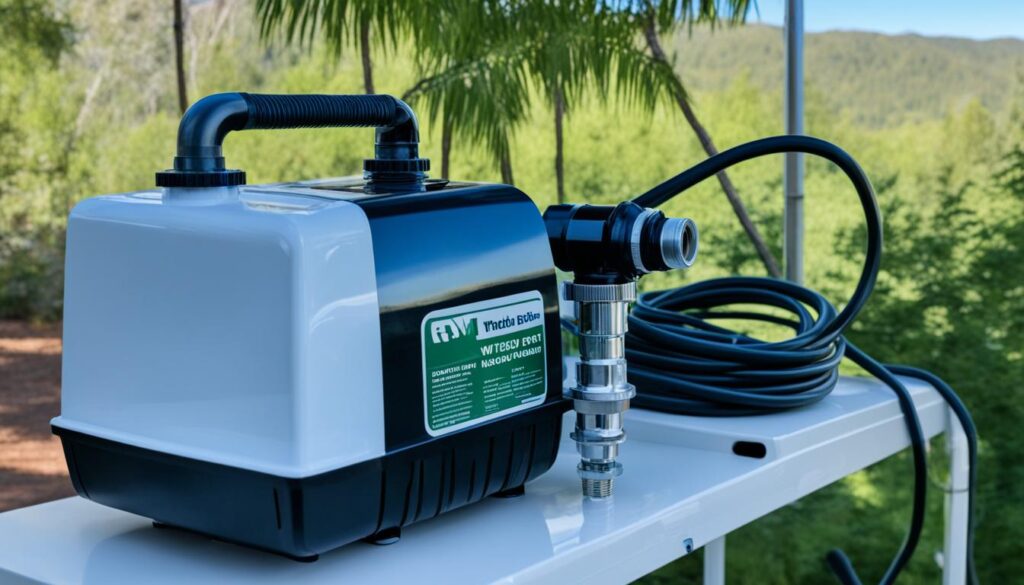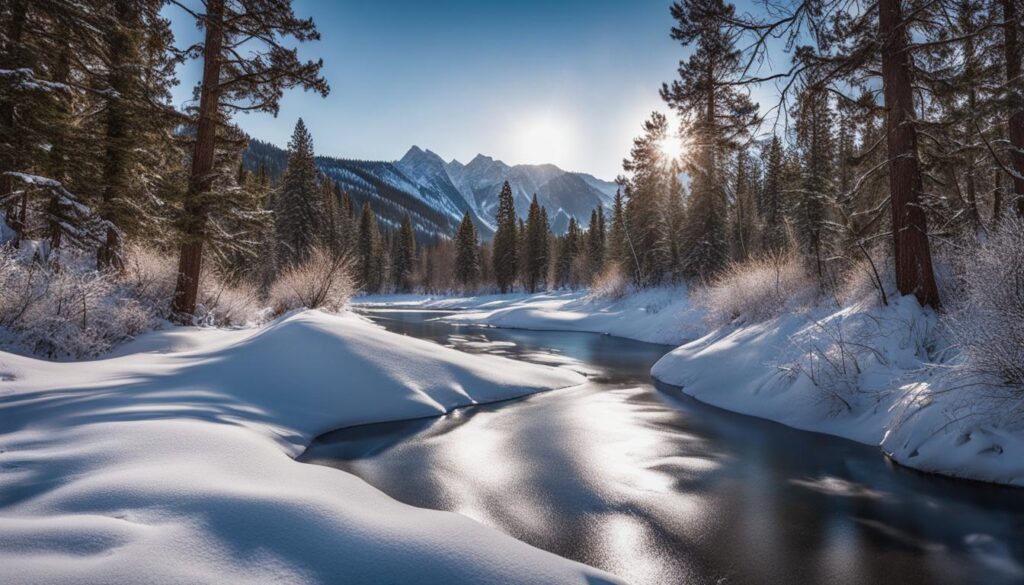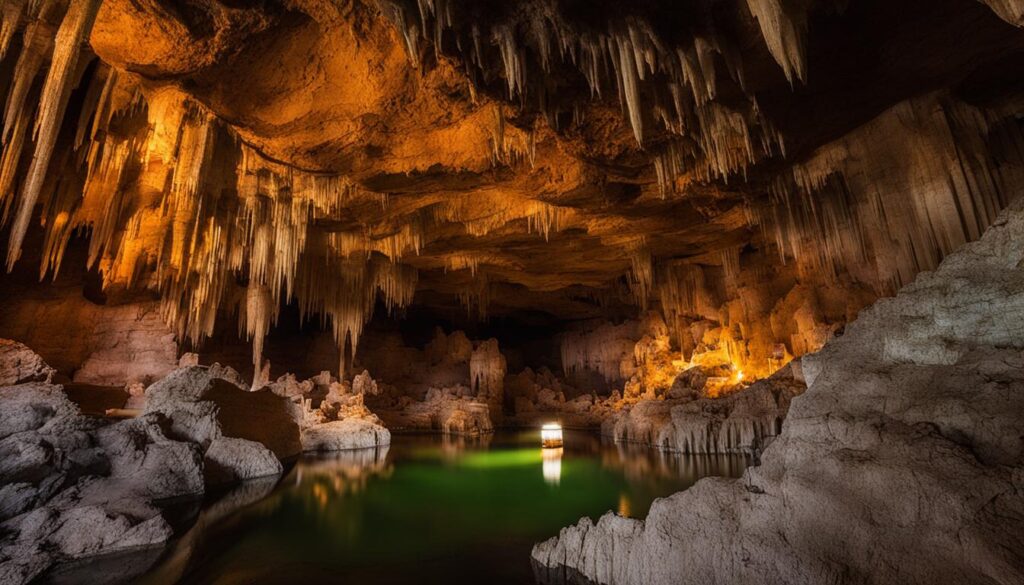Have you ever wondered if you need to keep your RV water pump on when connected to city water? It’s a common question among RV owners looking to optimize their water systems. The answer is not as straightforward as you might think. There are several factors to consider when deciding whether to keep the water pump on or turn it off. So, when should you use your RV water pump, and when is it acceptable to leave it off? Let’s delve into the details and find out!
Key Takeaways:
- The use of the RV water pump when connected to city water depends on various factors and situations.
- Leaving the water pump on is generally acceptable in normal use, such as camping in rural areas or at an RV park.
- However, there are instances when it’s best to turn off the water pump to avoid potential issues or wastefulness.
- It’s necessary to turn off the water pump during rough travel and when leaving the RV for an extended period of time.
- Regular maintenance and inspection of the RV water pump are crucial for its proper functioning and longevity.
Contents
- 1 Can I Leave My RV Water Pump On?
- 2 When to Turn Off Your RV Water Pump
- 3 Other Considerations When Using the RV Water Pump
- 4 Benefits of Maintaining the RV Water Pump
- 5 Potential Problems and Troubleshooting RV Water Pump
- 6 Benefits of Using Different Types of RV Water Pumps
- 7 Conclusion: Proper Management of RV Water Pump Usage
- 8 FAQ
- 9 Source Links
Can I Leave My RV Water Pump On?
The question of whether it is permissible to leave the water pump on in an RV does not have a simple yes or no answer. It depends on the specific circumstances and usage of the RV. In normal use, such as camping in rural areas or at an RV park, it is generally acceptable to leave the water pump on. The fresh water pump in an RV operates as an on-demand pump, meaning it only activates when a faucet is turned on, a shower is started, or the toilet is flushed. However, there are certain situations when it is best to turn off the water pump to avoid potential issues or wastefulness.
When connected to a city water hookup or any external water source, such as a campground, you can leave the RV water pump off. The city water connection provides a direct and constant supply of water to the RV’s plumbing system, eliminating the need for the water pump. Leaving the water pump off when connected to city water helps preserve its life and prevents unnecessary wear and tear. Additionally, it conserves battery power, as the water pump requires electricity to operate.
On the other hand, if you are not connected to a city water hookup or any external water source, you may need to leave the water pump on to access water in your RV. In such cases, leaving the water pump on is necessary to provide water pressure and flow when using faucets, showers, or toilets. The water pump will automatically activate and provide water as per your demand.
It is important to note that leaving the water pump on continuously can lead to excessive cycling and potential overheating of the pump, especially if there are no faucets or other water outlets open. This can reduce the lifespan of the pump and may result in premature failure. Therefore, it is advisable to turn off the water pump when not in use for longer periods or when leaving the RV unattended to conserve energy and prevent unnecessary wear.
Remember to always follow the manufacturer’s instructions and recommendations regarding the use of your RV water pump. They may provide specific guidelines based on the make and model of your RV and its water system.
In summary, whether you can leave your RV water pump on depends on the specific circumstances and usage of your RV. In most cases, it is acceptable to leave the water pump on when camping in remote areas or at RV parks. However, when connected to a city water hookup or when not in use for extended periods, it is advisable to turn off the water pump to conserve energy and prevent unnecessary wear. Always refer to your RV manufacturer’s guidelines for the optimal use and maintenance of your RV water pump.
When to Turn Off Your RV Water Pump
Proper management of the RV water pump is essential to prevent potential issues and ensure the efficient functioning of your RV water system. Knowing when to turn off the water pump is crucial to avoid unnecessary pumping, flooding, or drained batteries.
Vibrations During Travel
When you’re on the move, such as moving from one campsite to another, it is necessary to turn off the RV water pump. The vibrations during travel can inadvertently activate faucets, leading to potential flooding or filling of the grey water tank. By turning off the water pump during rough travel, you can prevent these accidents and avoid water wastage.
Connected to City Water
If you’re connected to city water, it is advisable to turn off the RV water pump. Leaving the water pump on when connected to city water can result in unnecessary pumping from the fresh water tank. This can quickly deplete your water supply, leading to an empty tank. By turning off the water pump in this scenario, you can conserve your water resources and ensure a steady supply of city water without relying on your RV’s water tank.
Extended Periods of Absence
When leaving your RV unattended for an extended period of time, it is wise to turn off the water pump. This precautionary measure helps prevent possible leaks, floods, or drained batteries. By turning off the water pump, you reduce the risk of any plumbing mishaps or energy wastage while you’re away.
| Scenarios | Action |
|---|---|
| Vibrations during travel | Turn off the water pump |
| Connected to city water | Turn off the water pump |
| Extended periods of absence | Turn off the water pump |
By understanding the appropriate situations to turn off your RV water pump, you can ensure the longevity of your RV’s water system and avoid unnecessary water consumption or potential damage. Taking these precautions will contribute to a trouble-free and enjoyable RV experience.
Other Considerations When Using the RV Water Pump
In addition to the main scenarios mentioned above, there are other factors to consider when deciding whether to turn off the RV water pump. It’s essential to prioritize the smooth operation of the water pump to ensure a comfortable and stress-free adventure. Here are a few additional considerations:
Some RV water pumps can be quite loud, which may cause sleep disturbances for light sleepers. If noise is a concern, it’s recommended to turn off the water pump during quiet hours or utilize noise-cancelling techniques.
Furthermore, it’s crucial to remain vigilant for potential leaks or malfunctions in the water pump. While many pumps are reliable, unexpected issues can arise. Regularly inspect the pump for any signs of leaks or defects, and address them promptly to prevent further damage.
In extremely cold temperatures, leaving the water pump on can help prevent freezing within the system. By allowing a small amount of water to continuously flow through the pipes, the risk of freezing is minimized, safeguarding your RV against potential damage.
Remember, it’s important to assess these considerations alongside the main scenarios discussed earlier to make informed decisions regarding your RV water pump usage. By staying proactive and attentive, you can ensure a reliable and efficient water system throughout your travels.
Summary:
- Some RV water pumps can be loud, causing sleep disturbances for light sleepers.
- Be aware of possible leaks or malfunctions in the water pump and address them promptly.
- In extremely cold temperatures, leaving the water pump on can help prevent freezing by allowing a small amount of water to continuously flow through the system.
Benefits of Maintaining the RV Water Pump
Regular maintenance of the RV water pump is crucial for ensuring its proper functioning and avoiding any unexpected issues while on the road. By following a few essential maintenance steps, you can prolong the life of your RV water pump and keep your water system running smoothly.
Here are some key benefits of maintaining your RV water pump:
- Early issue identification: Performing an annual RV inspection that includes checking water lines for leaks can help you identify any potential problems before they worsen. This proactive approach allows you to address issues promptly and avoid water pump failure on your trips.
- Prevention of debris damage: Cleaning the filter between the fresh water tank and pump is essential to prevent debris from clogging the pump and causing damage. Regular filter cleaning maintains optimal water flow and protects your RV water pump from unnecessary wear and tear.
- Algae prevention: Sanitizing the water lines, especially after the RV has been unused for a while, helps prevent algae growth in the lines. Algae buildup can lead to clogs and damage to the pump. By regularly sanitizing your water system, you can keep your RV water pump free from potential damage caused by algae.
- Reliability on the road: Testing your RV water pump before each trip ensures that it is working correctly and avoids any unexpected problems along the way. A simple test can help you catch any issues with the pump’s performance, such as low water pressure or unusual noises, allowing you to address them in advance.
By incorporating these maintenance practices into your RV care routine, you can enjoy worry-free travels and extend the lifespan of your RV water pump.
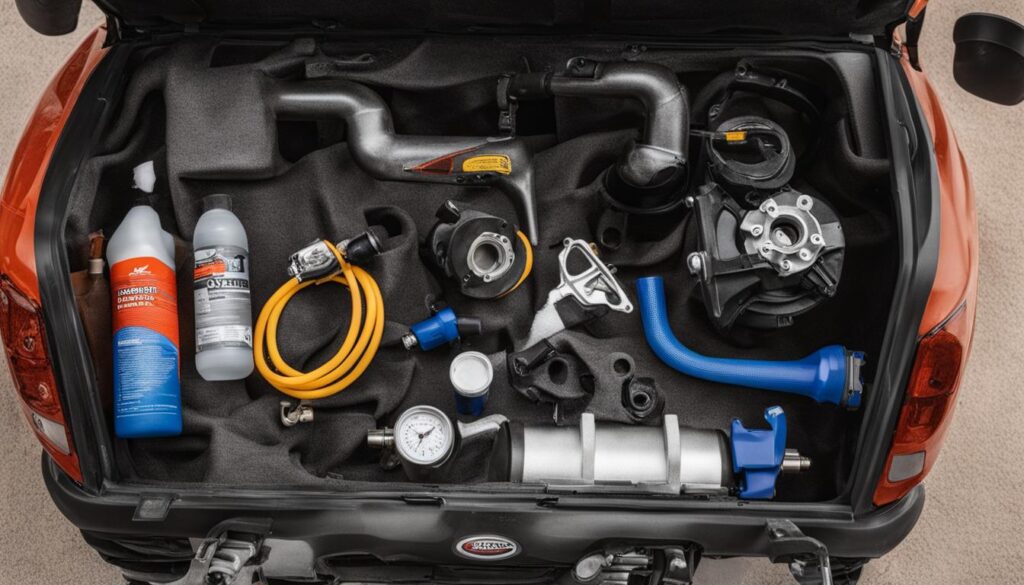
Potential Problems and Troubleshooting RV Water Pump
Despite regular maintenance, RV water pumps can encounter various problems. It’s important to be aware of common issues and know how to troubleshoot them to ensure the proper functioning of your RV water system.
If your RV water pump is not starting, it may be due to a low battery or problems with the pump switch or wiring. Start by checking the battery charge and ensuring that there are no loose connections or broken fuses. Addressing these issues can help get your pump up and running again.
Another problem you may encounter is a pump that runs continuously even when not in use. This likely indicates a leak in the system, which needs to be addressed promptly. Inspect all the connections and plumbing fixtures to identify the source of the leak and fix it to avoid water wastage and potential damage.
When the pump is running, but no water is coming out of the fixtures, it could be due to low water levels in the fresh water tank or a problem with the pump’s connections. Check the tank level and ensure that the pump is properly connected and primed. This will help diagnose and resolve the issue.
Some RV water pumps can be loud and cause disturbances, especially for light sleepers. To minimize noise, consider securing the pump to a padding material or investing in noise-reducing accessories specifically designed for RV water pump systems. This will help create a more comfortable and peaceful environment.
“Proper troubleshooting of RV water pump problems ensures a smooth and enjoyable RV experience.”
Pump pulsation is another issue that can occur with RV water pumps. If you notice the pump cycling on and off rapidly, it may be due to a misadjusted shut-off pressure setting on the pressure switch. Adjusting the pressure switch can help resolve this pulsation problem and maintain a consistent water flow.
Troubleshooting RV water pump problems requires patience and a systematic approach. By addressing these common issues, you can keep your RV water system in good working condition and prevent potential disruptions during your travels.
Common RV Water Pump Problems and Troubleshooting Tips:
- Pump not starting: Check battery charge, pump switch, and wiring.
- Continuous running when not in use: Look for leaks in the system and fix them.
- No water coming out of fixtures: Check water tank level and pump connections.
- Noisy pump: Secure pump to padding or consider noise-reducing accessories.
- Pump pulsation: Adjust the shut-off pressure setting on the pressure switch.
Benefits of Using Different Types of RV Water Pumps
When it comes to choosing the right RV water pump, there are various options available, each with its own set of advantages. Understanding the different types of RV water pumps can help you make an informed decision based on your specific needs and preferences.
Constant Speed RV Pumps
Constant speed pumps are the most common and affordable option in the market. These pumps deliver water at a consistent speed regardless of demand. They operate at a fixed RPM, ensuring a steady flow of water throughout your RV’s water system. Constant speed pumps are reliable, durable, and suitable for standard RVs.
Variable Speed RV Pumps
Variable speed pumps offer greater efficiency and less noise compared to constant speed pumps. These pumps adjust their motor’s RPM based on the demand, allowing them to maintain a more constant pressure. As a result, variable speed pumps consume less energy and provide a quieter water system experience. They are ideal for RV owners who prioritize energy efficiency and seek a quieter pump operation.
High Volume RV Pumps
High volume pumps are designed for larger applications that require a higher volume of water. While not necessary for standard RVs, these pumps are suitable for specific needs such as filling large tanks or supplying water to multiple fixtures simultaneously. High volume pumps provide the capability to handle higher water demands, making them valuable for RV owners with unique water system requirements.
Choosing the right type of RV water pump ultimately depends on your individual needs, budget, and personal preferences. Constant speed pumps are the go-to option for most RV owners due to their affordability and reliability. However, if you prioritize energy efficiency and quieter operation, a variable speed pump may be the better choice. High volume pumps are reserved for specific situations where larger water volumes are required.
It is important to assess your water usage patterns and requirements to determine the most appropriate type of RV water pump for your needs. Consider factors such as the size of your RV, the number of people using the water system, and the types of activities you engage in while on the road. By selecting the right RV water pump, you can ensure a reliable and efficient water system that meets your needs throughout your RVing adventures.
| Type of RV Water Pump | Advantages |
|---|---|
| Constant Speed RV Pumps | Most common and affordable option |
| Variable Speed RV Pumps | Energy-efficient and quieter operation |
| High Volume RV Pumps | Capable of handling higher water demands |
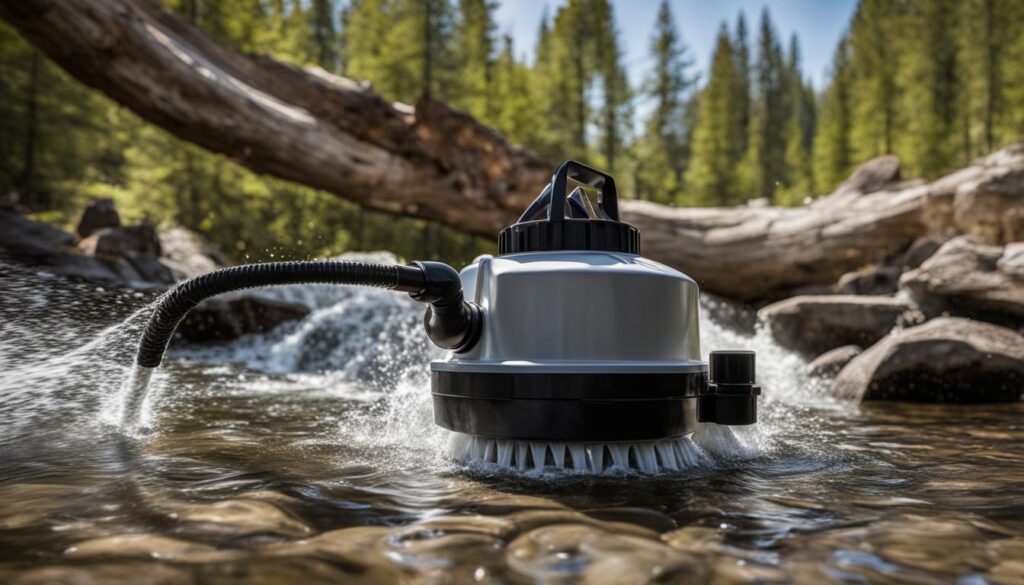
Conclusion: Proper Management of RV Water Pump Usage
In order to have a hassle-free and enjoyable RV experience, it is crucial to properly manage the RV water pump. Understanding when to turn off the water pump and when it can be left on, depending on the specific scenarios, is key. Regular maintenance and inspection of the RV water pump play a vital role in ensuring its longevity and optimal performance. By following these guidelines, RV owners can effectively manage their water system and prevent potential issues while on the road.
Managing the RV water pump involves being aware of when to turn it off. During rough travel, such as moving from one campsite to another, it is necessary to turn off the water pump to avoid flooding or filling of the grey water tank due to vibrations. Additionally, when connected to city water, turning off the water pump prevents unnecessary pumping from the fresh water tank, resulting in an empty tank.
Proper maintenance of the RV water pump is also crucial. Performing regular inspections, checking for leaks, cleaning the filter, and sanitizing the water lines are all important steps to ensure the pump’s proper functioning. Testing the pump before each trip avoids unexpected problems on the road. By effectively managing and maintaining the RV water pump, RV owners can have peace of mind and enjoy their adventures without worrying about water system issues.
FAQ
When should I turn off the RV water pump?
You should turn off the RV water pump during rough travel, when leaving the RV for an extended period of time, or when connected to city water to avoid potential issues or wastefulness.
Can I leave the RV water pump on?
Yes, it is generally acceptable to leave the RV water pump on in normal use, such as camping in rural areas or at an RV park, as it operates on-demand.
What other considerations should I keep in mind when using the RV water pump?
It is important to be aware of possible leaks or malfunctions in the water pump, the noise level of the pump, and the prevention of freezing in extremely cold temperatures.
What are the benefits of maintaining the RV water pump?
Regular maintenance of the RV water pump ensures its proper functioning, prevents potential issues, and extends its longevity.
What are some potential problems with the RV water pump and how can they be troubleshooted?
Potential problems with the RV water pump include low battery, issues with the pump switch or wiring, leaks in the system, or low water in the fresh water tank. Troubleshooting methods include checking connections, fuses, and adjusting the shut-off pressure setting on the pressure switch.
What are the benefits of using different types of RV water pumps?
Constant speed pumps are the most common and affordable option, while variable speed pumps offer more efficiency and less noise. High volume pumps are suitable for larger applications. Choosing the right type depends on individual needs and preferences.
What is the proper management of RV water pump usage?
Proper management includes understanding when to turn off the water pump, performing regular maintenance and inspection, and testing the pump before each trip to ensure its proper functioning.
